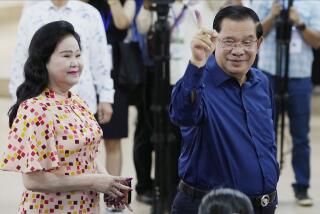Why Khmer Rouge Is a Deal Breaker : Cambodia now needs to move forward without inclusion of the worst from its past
- Share via
Bloodshed in Somalia and Bosnia. The violence in these regions tarnishes U.N. peacekeeping efforts and diverts attention from a place where the world body has helped to make a difference--Cambodia. Thanks to an ambitious U.N.-sponsored election and peacekeeping effort, the Southeast Asian country now has a new constitution, a new government and a new king. That’s a start.
Certainly the government will be a fragile coalition, peace will be uneasy and Norodom Sihanouk, 70, who returns to the throne that he abdicated in the mid-1950s, will be as mercurial as ever. However, as the U.N. Transitional Authority in Cambodia (UNTAC) prepares to phase out its presence in the country after a two-year stay, in place is a democratic government that was voted into power by 90% of the electorate. That speaks well for the United Nations’ largest-ever peacekeeping mission, which cost $2.6 billion and at one time deployed up to 22,000 soldiers and civilians.
So Cambodia, racked by civil war for more than 20 years, begins a new political era.
The Constituent Assembly overwhelmingly adopted a new national charter that places the country in the hands of a constitutional monarchy and a coalition government. The government, unique to Cambodia, has two prime ministers--Prince Norodom Ranariddh, Sihanouk’s son and leader of the royalist FUNCINPEC party, which came in first in the May elections, and Hun Sun, the former communist who ruled Cambodia for most of the 1980s and whose party was second in the voting.
The delicately balanced coalition significantly does not include the Khmer Rouge. For now, the murderous Khmer Rouge, which has been waging a guerrilla war since being ousted from political power in 1979, is seen as marginalized and plagued by defections. Because it refused to participate in the elections it has no elected representative in the Assembly. The new constitution requires government ministers and vice ministers to be selected from parties having members in the Assembly, thus high-level participation by the Khmer Rouge apparently is out.
Now, as in the past, the Khmer Rouge is the wild card in Cambodia’s quest for peace. Sihanouk still favors somehow including the Maoist group, as called for in the 1991 Paris peace accord.
The Khmer Rouge, although it did not face the voters, is now demanding an advisory role in the new government. Were that historically brutal group to be included now, without agreeing to disarm and to open the 20% of the country that it controls, Cambodia would--and should--face major obstacles to receiving American aid to rebuild the nation.
More to Read
Sign up for Essential California
The most important California stories and recommendations in your inbox every morning.
You may occasionally receive promotional content from the Los Angeles Times.













